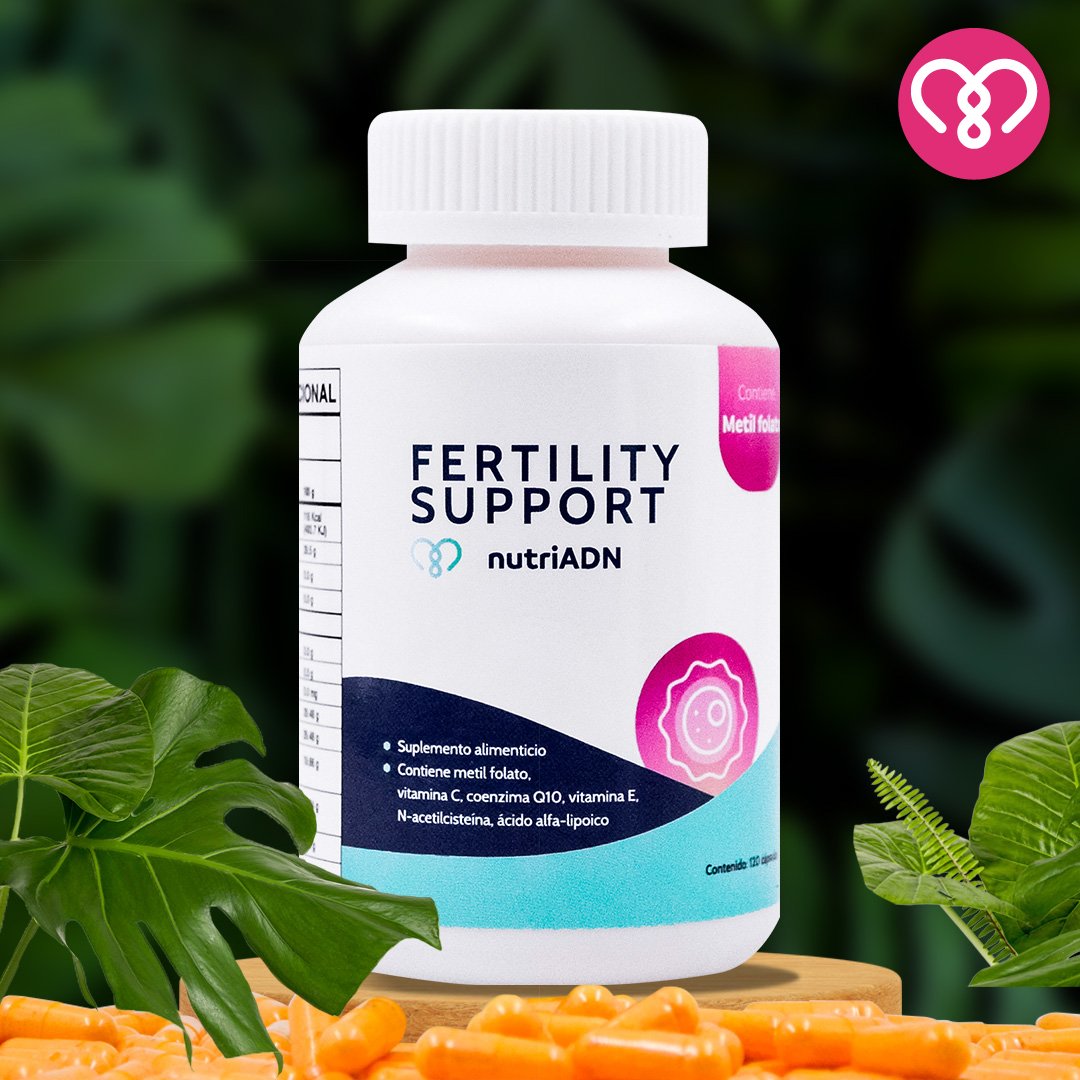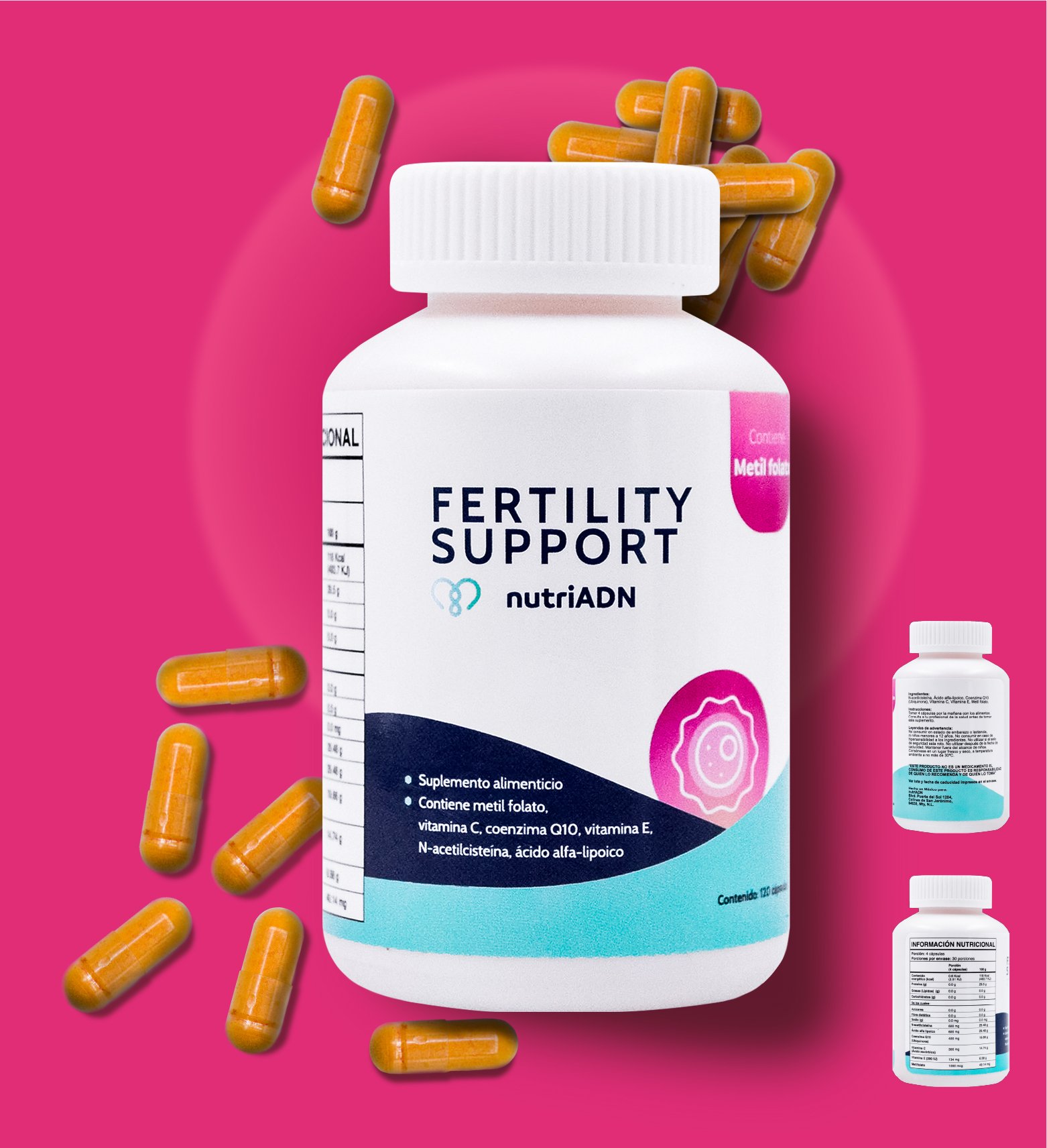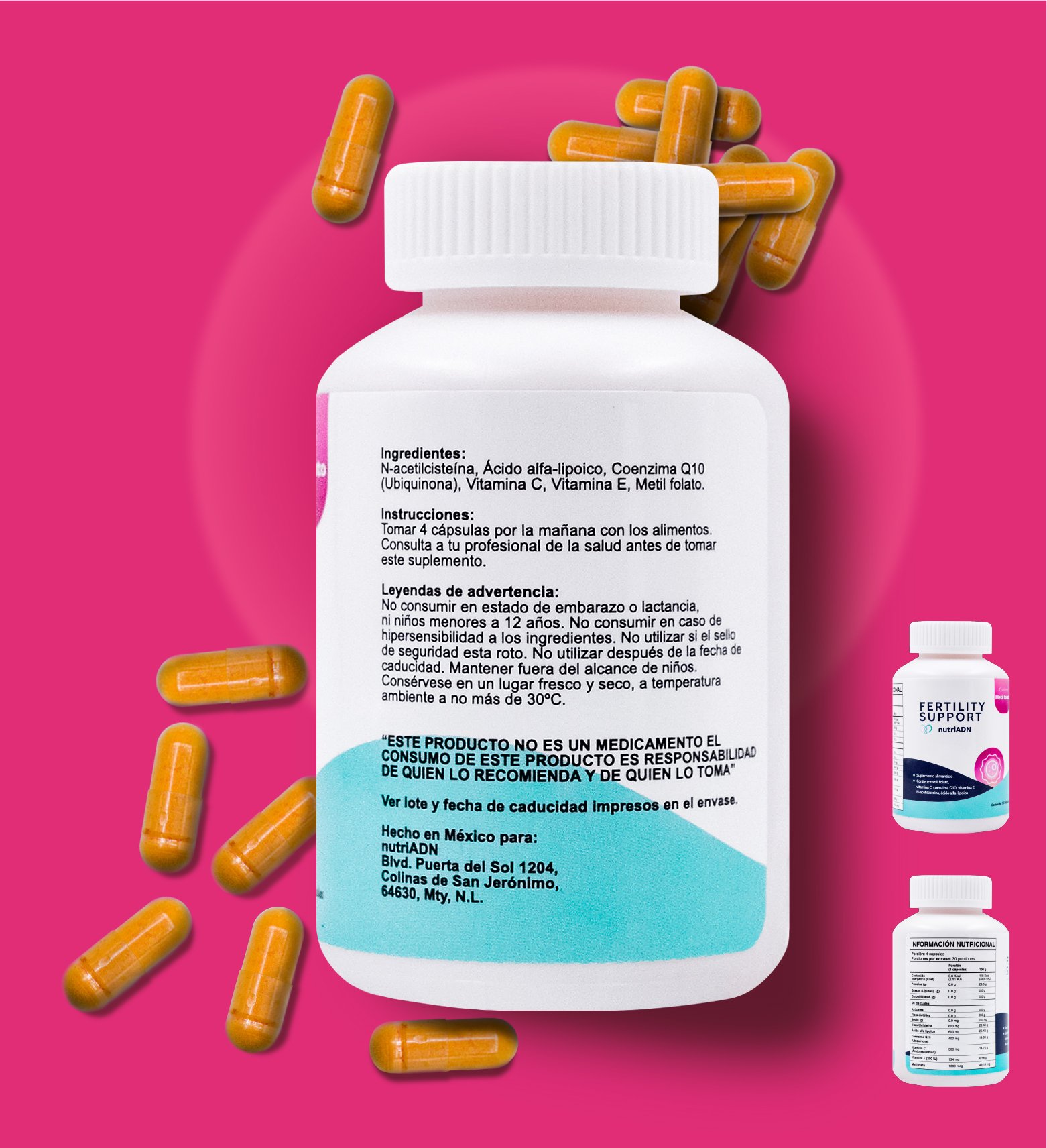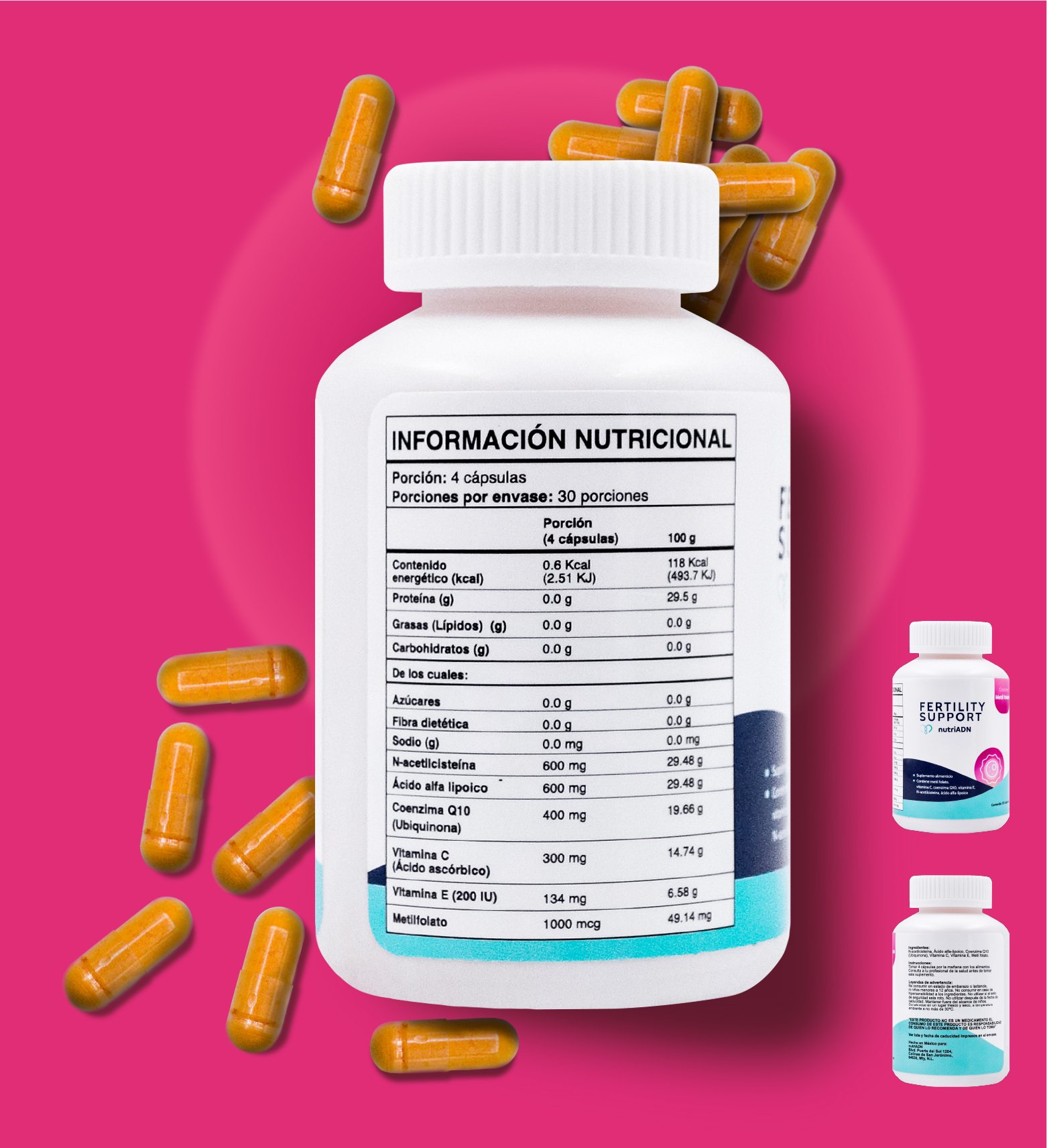



Fertility Support
Nuestra formulación de 120 cápsulas aporta el beneficio de distintos ingredientes como NAC, Ácido Alfa Lipoico, Coenzima Q10, Vitamina C, Vitamina E y Metilfolato (la forma más biodisponible del ácido fólico).
La combinación de todos estos ingredientes puede fungir como auxiliar para mejorar la calidad ovárica y aumentar las probabilidades de embarazo.
$1,290.00 MXN
¿Quién necesita este producto?
Para mujeres que buscan un auxiliar para mejorar la calidad ovárica.
Ingredientes Clave
NAC | 600 mg
Se ha observado especialmente en mujeres con SOP, que el NAC, puede fungir como auxiliar en el proceso de ovulación, apoyando en su mejora.
Ácido alfa lipoico | 600 mg
Apoya a la mitocondria a producir energía y combatir el estrés oxidativo. Es un antioxidante beneficioso para el reciclaje de CoQ10, vitamina C y E, nutrientes esenciales que podrían apoyar la calidad ovárica.
Coenzima Q10 | 400 mg
Podría jugar un papel muy importante en la producción de energía por parte de la mitocondria lo que ayuda en la maduración de los óvulos. También tiene poderosa capacidad antioxidante.
Vitamina C | 300 mg
Vitamina que apoya en los procesos de producción de antioxidantes y en la defensa contra el estrés oxidativo, lo cual podría afectar la calidad del óvulo.
Vitamina E | 134 mg
Apoya en la reducción del daño en los folículos ováricos por los radicales libres.
Metilfolato | 1000 mcg
Una forma más biodisponible del ácido fólico (se absorbe mejor). Requerido para un correcto proceso de metilación, proceso necesario para crear ADN.
¿Cómo utilizar este producto?
Consumir 4 cápsulas por la mañana con los alimentos.
Información Nutricional
Referencias Científicas
Carboni, L. (2022). Active Folate Versus Folic Acid: The Role of 5-MTHF (Methylfolate) in Human Health. Integrative Medicine, 21(3).
Chiara Di Tucci, Mara Di Feliciantonio, Flaminia Vena, Carmela Capone, Michele Carlo Schiavi, Daniela Pietrangeli, Ludovico Muzii & Pierluigi Benedetti Panici. (2018): Alpha lipoic acid in obstetrics and gynecology, Gynecological Endocrinology, DOI: 10.1080/09513590.2018.1462320
Ben‐Meir, A., Burstein, E., Borrego‐Alvarez, A., Chong, J., Wong, E., Yavorska, T., ... & Jurisicova, A. (2015). Coenzyme Q10 restores oocyte mitochondrial function and fertility during reproductive aging. Aging cell, 14(5), 887-895.
Ma, L., Cai, L., Hu, M., Wang, J., Xie, J., Xing, Y., ... & Liu, J. (2020). Coenzyme Q10 supplementation of human oocyte in vitro maturation reduces postmeiotic aneuploidies. Fertility and Sterility, 114(2), 331-337.
Giannubilo, S. R., Orlando, P., Silvestri, S., Cirilli, I., Marcheggiani, F., Ciavattini, A., & Tiano, L. (2018). CoQ10 supplementation in patients undergoing IVF-ET: The relationship with follicular fluid content and oocyte maturity. Antioxidants, 7(10), 141.
Mínguez-Alarcón, L., Gaskins, A. J., Chiu, Y. H., Souter, I., Williams, P. L., Calafat, A. M., ... & EARTH Study Team. (2016). Dietary folate intake and modification of the association of urinary bisphenol A concentrations with in vitro fertilization outcomes among women from a fertility clinic. Reproductive Toxicology, 65, 104-112.
Florou, P., Anagnostis, P., Theocharis, P., Chourdakis, M., & Goulis, D. G. (2020). Does coenzyme Q 10 supplementation improve fertility outcomes in women undergoing assisted reproductive technology procedures? A systematic review and meta-analysis of randomized-controlled trials. Journal of assisted reproduction and genetics, 37, 2377-2387.
Canosa, S., Paschero, C., Carosso, A., Leoncini, S., Mercaldo, N., Gennarelli, G., ... & Revelli, A. (2020). Effect of a combination of myo-inositol, alpha-lipoic acid, and folic acid on oocyte morphology and embryo morphokinetics in non-PCOS overweight/obese patients undergoing IVF: a pilot, prospective, randomized study. Journal of Clinical Medicine, 9(9), 2949.
Chen, J., Guo, Q., Pei, Y. H., Ren, Q. L., Chi, L., Hu, R. K., & Tan, Y. (2020). Effect of a short-term vitamin E supplementation on oxidative stress in infertile PCOS women under ovulation induction: a retrospective cohort study. BMC women's health, 20, 1-9.
Rago, R., Marcucci, I., Leto, G., Caponecchia, L., Salacone, P., Bonanni, P., ... & Sebastianelli, A. (2015). Effect of myo-inositol and alpha-lipoic acid on oocyte quality in polycystic ovary syndrome non-obese women undergoing in vitro fertilization: a pilot study. J Biol Regul Homeost Agents, 29(4), 913-923.
Shahin, A. Y., Hassanin, I. M., Ismail, A. M., Kruessel, J. S., & Hirchenhain, J. (2009). Effect of oral N-acetyl cysteine on recurrent preterm labor following treatment for bacterial vaginosis. International Journal of Gynecology & Obstetrics, 104(1), 44-48.
Al-Katib, S. R., Al-Kaabi, M. M., Al-Safi, W. G., & Al-Bderi, A. J. (2018). Effect of the relationship between vitamin C and serum ferritin on fertility. Al-Kufa University Journal for Biology, 10(1).
Mier-Cabrera, J., Genera-García, M., De la Jara-Díaz, J., Perichart-Perera, O., Vadillo-Ortega, F., & Hernández-Guerrero, C. (2008). Effect of vitamins C and E supplementation on peripheral oxidative stress markers and pregnancy rate in women with endometriosis. International Journal of Gynecology & Obstetrics, 100(3), 252-256
Ruder, E. H., Hartman, T. J., Reindollar, R. H., & Goldman, M. B. (2014). Female dietary antioxidant intake and time to pregnancy among couples treated for unexplained infertility. Fertility and sterility, 101(3), 759-766.
Mahmoud, M. A. E. (2021). Luteal phase Vitamin C supplementation on the outcome of in-vitro fertilization. The Egyptian Journal of Fertility of Sterility, 25(2), 28-35.
Servy, E. J., Jacquesson-Fournols, L., Cohen, M., & Menezo, Y. J. (2018). MTHFR isoform carriers. 5-MTHF (5-methyl tetrahydrofolate) vs folic acid: a key to pregnancy outcome: a case series. Journal of assisted reproduction and genetics, 35, 1431-1435.
Özkaya, M. O., & Nazıroğlu, M. (2010). Multivitamin and mineral supplementation modulates oxidative stress and antioxidant vitamin levels in serum and follicular fluid of women undergoing in vitro fertilization. Fertility and sterility, 94(6), 2465-2466.
Badawy, A., State, O., & Abdelgawad, S. (2007). N-Acetyl cysteine and clomiphene citrate for induction of ovulation in polycystic ovary syndrome: a cross-over trial. Acta obstetricia et gynecologica Scandinavica, 86(2), 218-222.
Amin, A. F., Shaaban, O. M., & Bediawy, M. A. (2008). N-acetyl cysteine for treatment of recurrent unexplained pregnancy loss. Reproductive Biomedicine Online, 17(5), 722-726.
Olesen, H. Ø., Pors, S. E., Jensen, L. B., Grønning, A. P., Lemser, C. E., Nguyen Heimbürger, M. T. H., ... & Kristensen, S. G. (2021). N-acetylcysteine protects ovarian follicles from ischemia-reperfusion injury in xenotransplanted human ovarian tissue. Human Reproduction, 36(2), 429-443.
Westphal, L. M., Polan, M. L., Trant, A. S., & Mooney, S. B. (2004). A nutritional supplement for improving fertility in women. J Reprod Med, 49(4), 289-93.
Xu, Y., Nisenblat, V., Lu, C., Li, R., Qiao, J., Zhen, X., & Wang, S. (2018). Pretreatment with coenzyme Q10 improves ovarian response and embryo quality in low-prognosis young women with decreased ovarian reserve: a randomized controlled trial. Reproductive Biology and Endocrinology, 16(1), 1-11.
Showell, M. G., Mackenzie-Proctor, R., Jordan, V., & Hart, R. J. (2020). Antioxidants for female subfertility. Cochrane Database of Systematic Reviews, (8).
Smits, R. M., Mackenzie-Proctor, R., Fleischer, K., & Showell, M. G. (2018). Antioxidants in fertility: Impact on male and female reproductive outcomes. Fertility and sterility, 110(4), 578-580.
Amini, L., Chekini, R., Nateghi, M. R., Haghani, H., Jamialahmadi, T., Sathyapalan, T., & Sahebkar, A. (2021). The effect of combined vitamin C and vitamin E supplementation on oxidative stress markers in women with endometriosis: a randomized, triple-blind placebo-controlled clinical trial. Pain Research and Management, 2021, 1-6.
Grajecki, D., Zyriax, B. C., & Buhling, K. J. (2012). The effect of micronutrient supplements on female fertility: a systematic review. Archives of gynecology and obstetrics, 285, 1463-1471
Collins, G. G., & Rossi, B. V. (2015). The impact of lifestyle modifications, diet, and vitamin supplementation on natural fertility. Fertility Research and Practice, 1(1), 1-9.
Serapinas, D., Boreikaite, E., Bartkeviciute, A., Bandzeviciene, R., Silkunas, M., & Bartkeviciene, D. (2017). The importance of folate, vitamins B6 and B12 for the lowering of homocysteine concentrations for patients with recurrent pregnancy loss and MTHFR mutations. Reproductive Toxicology, 72, 159-163.
Altmäe, S., Stavreus-Evers, A., Ruiz, J. R., Laanpere, M., Syvänen, T., Yngve, A., ... & Nilsson, T. K. (2010). Variations in folate pathway genes are associated with unexplained female infertility. Fertility and sterility, 94(1), 130-137.
Leahy, L. G. (2017). Vitamin B Supplementation: What's the right choice for your patients?. Journal of Psychosocial Nursing and Mental Health Services, 55(7), 7-11.
Mohd Mutalip, S. S., Ab-Rahim, S., & Rajikin, M. H. (2018). Vitamin E as an antioxidant in female reproductive health. Antioxidants, 7(2), 22.
ESTE PRODUCTO NO ES UN MEDICAMENTO. EL CONSUMO DE ESTE PRODUCTO ES RESPONSABILIDAD DE QUIEN LO RECOMIENDA Y DE QUIEN LO USA.
No exceder la porción diaria recomendada.
Seguir las instrucciones de uso que aparecen en la etiqueta.
Conservar el producto en un lugar fresco y seco. Mantener fuera del alcance de los niños, No se administre a menores de 18 años.
Personas con alguna condición médica específica consultar a su médico antes de consumir este producto.
NO SE RECOMIENDA SU USO EN MUJERES EMBARAZADAS Y/O EN PERÍODO DE LACTANCIA SIN SUPERVISIÓN MÉDICA.





